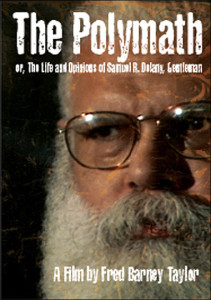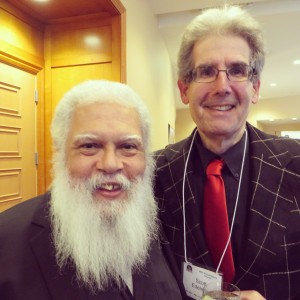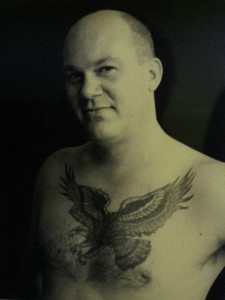Follow Scott
Recent Tweets
- Waiting for Twitter... Once Twitter is ready they will display my Tweets again.
Latest Photos
Search
Tags
anniversary Balticon birthdays Bryan Voltaggio Capclave comics Cons context-free comic book panel conventions DC Comics dreams Eating the Fantastic food garden horror Irene Vartanoff Len Wein Man v. Food Marie Severin Marvel Comics My Father my writing Nebula Awards Next restaurant obituaries old magazines Paris Review Readercon rejection slips San Diego Comic-Con Scarecrow science fiction Science Fiction Age Sharon Moody Stan Lee Stoker Awards StokerCon Superman ukulele Video Why Not Say What Happened Worldcon World Fantasy Convention World Horror Convention zombies
©2025 Scott Edelman
Time travel to 2001 for Episode 7 of Eating the Fantastic with Samuel R. Delany
Posted by: Scott
Tags:
Eating the Fantastic, food, Samuel R. Delany
Posted date:
April 29, 2016 |
No comment
The latest episode of Eating the Fantastic was recorded 15 years before Eating the Fantastic began.
How is that possible?
Well, when it comes to Chip Delany, all things are possible.
On June 18, 2001, while Chip was in the middle of a book tour supporting the 25th anniversary republication of Dhalgren, I interviewed him at Bistro Bis in the Hotel George. The recording I made that day wasn’t created to be heard, but was merely a tool so it could be transcribed and run as text in Science Fiction Weekly, a site I edited during my 13 years at the Syfy Channel.
It had been awhile since I’d thought of that interview, but once I got the first half dozen episodes of Eating the Fantastic live—all of which you can download from iTunes—I dug deep into the vault and found the tapes of that meal. And when I asked Chip if he’d mind me sharing that audio with you, he was gracious enough to say—go for it!
We took no photos that day— of either the food or each other—so this pic of us together during the 2014 Nebula Awards weekend will have to suffice. Knock off a decade or so of age and you’ll get the idea.
And now it’s time to time travel back to 2001 for lunch with Chip as we discuss the 25th anniversary edition of his magnum opus Dhalgren, the “sheer madness” of trying to write such a book in the first place, the state of the science fiction field during the mid-‘70s, the joys he receives from teaching, and much more.
Here’s how to pull up a chair at the table— (more…)
Unearthing my 1984 interview with Thomas M. Disch
Posted by: Scott
Tags:
Harlan Ellison, Isaac Asimov, John Crowley, Last Wave, Orson Scott Card, Ray Bradbury, Ron Goulart, Samuel R. Delany, science fiction, Thomas M. Disch, Vladimir Nabokov
Posted date:
March 1, 2015 |
1 Comment
More than 30 years ago, I conducted a lengthy interview with Tom Disch. How lengthy? Once transcribed, it came to nearly 18,500 words, and took up 48 pages of the Winter 1986 of Last Wave. I’ve been thinking of that interview ever since my recent share of an equally intensive interview with Chip Delany, and decided the conversation was worth reviving here. Tom, who was one of my instructors at Clarion in 1979, deserves to be remembered.
John Clute wrote this about Tom in the Science Fiction Encyclopedia:
Because of his intellectual audacity, the chillingly distanced mannerism of his narrative art, the austerity of the pleasures he affords, and the fine cruelty of his wit, Disch was perhaps the most respected, least trusted, most envied and least read of all modern sf writers of the first rank.
I’ve always been in awe of that description. Read on to see whether you agree it was deserved.
But before you begin, I feel a couple of trigger warnings are in order:
First—as part of a discussion of how Tom’s homosexuality might have affected his writing, I raised the issue of sex change operations in the context of how certain editors were biased against life choices choices they couldn’t understand. I cringed just now reading how I framed that question, because in the intervening three decades since I asked it, I’ve come to believe that’s a lousy term to describe what’s actually happening under those circumstances, which is the bringing about an alignment of one’s inner and outer selves. I’d never ask that question in the same way today—because I now think of the process as being not a change but a gender confirmation—and I’m sorry I raised the topic that way then. But in the interests of historical accuracy and not ducking responsibility, I’m leaving in the question as it was asked in 1984.
And as an addendum to that—if I’m putting my foot even more firmly into my mouth with the way I’m phrasing this trigger warning and apology, please feel free call me out on that, OK? My friends already know (I hope) that they’re free to do that, but I’d like the rest of you to know it, too.
As for second trigger warning—Tom makes a joking reference to John Norman novels and rape which I worry could be triggering for some. If you want to skip that completely, jump over the answer he gives to the question I raise about his review of a Ron Goulart novel.
Now that I’ve taken care of that—hoping that my attempts haven’t made things worse—here’s the entirely of the interview, as it appeared in the final issue of Last Wave.
Thomas M. Disch is one of the more talented and controversial figures in the science fiction field. His body of work encompasses short stories, novels, poems, opera libretti, essays, book reviews, and now even an interactive novel. In every instance he has chosen to work at a level of ambition of which only a handful of other genre writers share in the attempt. He has created works of a remarkably high quality, and at the same time enraged many for his failure to fall into the lockstep of genre requirements. The following interview took place on August 11, 1984 in Tom Disch’s Manhattan apartment.
Last Wave: I think of you as being a joyful writer, as opposed to being the depressing writer which many other people seem to paint you. In your early novel The Genocides, for instance, which is one often given as an example of a depressing work because the benign, indifferent aliens win, I find triumphal joy, for the protagonists in it do triumph with dignity against great odds over the human evil around them. In your recent On Wings of Song, which I’ve read one reviewer claim to be a cynical book, I see a happy ending: David Weinreb does get free and fly. For some reason many people prefer to see him as dying. In rereading these two works and all else inbetween, I just don’t see the cynicism which the overwhelming majority of readers chooses to focus on. Why do you think there is this myth of your work being such a downer? (more…)
Rescuing my long-ago lunch with Samuel R. Delany
Posted by: Scott
Tags:
Samuel R. Delany, Science Fiction Weekly, Syfy
Posted date:
January 25, 2015 |
No comment
I’ve been thinking quite a bit about Chip Delany and his writing recently, as evidenced by this post from a few weeks back, and that resulted in me suddenly remembering an interview I conducted with him more than thirteen years ago in support of the release of his 1974 novel Dhalgren.
The nearly 6,000-word interview originally ran on June 18, 2001 in Science Fiction Weekly #217. The contents of that magazine vanished from anywhere online save the Wayback Machine when Science Fiction Weekly merged with SCI FI Wire—or maybe it was when SCI Wire transformed into Blastr—taking this interview with it, which seems a shame. So here it is once more, rescued from the black hole of the Internet, following my original introduction …
(This photo of us, however, is from May 2014.)
Samuel R. Delany launched his science-fiction career as a 20-year-old publishing prodigy with the novel The Jewels of Aptor in 1962. Other critically-acclaimed novels and short stories quickly followed, as did recognition from both fans and peers. He earned Nebula Awards for his novel Babel-17 (1966), as well as the short stories “Aye, and Gomorrah … ” (1967) and “Time Considered as a Helix of Semi-Precious Stones” (1969), the latter of which also won a Hugo Award. By 1969, the author, editor and critic Algis Budrys was already calling Delany “the best science-fiction writer in the world,” which, based on the evidence at the time, did not seem to be that controversial a call.
The true controversy waited just around the corner. For at the height of his success, Delany sequestered himself to spend half a decade on his next project, Dhalgren, which when eventually published in 1974 was like no science-fiction novel seen before. The 800-page novel used experimental literary techniques to tell an apocalyptic tale containing explicit explorations of sexuality, race and gender. The controversial novel was either loved or hated, proving to be the most hotly debated SF novel of the decade. Vintage Books has just begun a publishing program to reissue all of Delany’s classic novels, beginning with Dhalgren.
Science Fiction Weekly interviewed Delany over lunch at the Hotel George in Washington, D.C., while he toured the country to promote Dhalgren‘s new home. (more…)
Falling short of Samuel R. Delany’s 40-year-old (but eternally relevant) standards
Posted by: Scott
Tags:
Joanna Russ, my writing, Samuel R. Delany, science fiction
Posted date:
January 10, 2015 |
1 Comment
A few weeks ago, I read Joanna Russ’s 1975 review of the movie A Boy and His Dog, which had originally been published in Frontiers: A Journal of Women’s Studies. I hadn’t intended to, and wasn’t deliberately seeking it out. I just came upon it the way one often does online, clicking through from link to link, and eventually ending up somewhere unexpected but necessary.
It’s a wonderful piece, and deserves your attention, as all of her work does, but the passage that intrigued me the most was a paraphrase of something Chip Delany once wrote:
According to Samuel Delany, a literary characterization proceeds by means of three kinds of actions: gratuitous, purposeful, and habitual, and well-written characters perform all three. (This classification certainly applies to realistic fiction, and I suspect it applies to all fiction, however stylized.) Sexist literature produces two kinds of female characters, both imperfect: the Heroine, whose actions are all gratuitious, and the Villainess, whose actions are all purposeful. Neither performs habitual actions.
This stood out for me because, being a writer, I immediately wanted to understand more fully exactly what Delany meant by these three classifications. I could tell the concept would be helpful to my own writing. And as I thought, hmmm, how will I ever track down the source, I suddenly remembered that due to this connected world in which we live, I could simply ask the source directly, since Chip and I are friends on Facebook. So I reached out to query where I could find his full essay explicating this idea.
It turns out the essay “Letter to the Symposium on Women In Science Fiction” originally appeared in an issue of Khatru, and was then reprinted in his non-fiction collection The Jewel-Hinged Jaw. But not, unfortunately, my copy of The Jewel-Hinged Jaw, as it’s a first edition. It can be found in the current expanded edition, though. I decided I’d pick up a copy at this year’s Readercon, where I could get him to autograph it, and then thought nothing more. (more…)
7 photos equals a Nebula Awards weekend
Posted by: Scott
Tags:
conventions, Cynthia Felice, Gene O'Neill, Jaym Gates, Jenn Reese, Nalo Hopkinson, Nebula Awards, Samuel R. Delany
Posted date:
May 24, 2014 |
No comment
I’ve been too busy this week to share how my Nebula Awards weekend went—I’d barely recovered from the redeye home when Geoff Landis and Mary Turzillo dropped by to spend the night on their way to Balticon—so these seven pics will have to stand in for a full report.
At the San Jose Airport Thursday with Cynthia Felice, who sat immediately in front of me on the flight from Denver. And as it turned out, Robin Wayne Baily sat in front of her! (more…)
What do Chip Delany and William Shatner have in common?
Posted by: Scott
Tags:
dreams, Samuel R. Delany, William Shatner
Posted date:
February 19, 2013 |
No comment
I had two dreams featuring a similar theme last night, and yes, I’m 100% sure they actually were two dreams, rather than a single dream shifting time and place, because I was awake between the two, getting up and scribbling down the initial dream before falling back asleep.
In the first, I was at a science fiction convention, only it was far classier than any science fiction convention I’ve ever been to. It was more like a classy Park Avenue cocktail party, with a bar, and waiters circulating with canapés, and someone tinkling away at a grand piano. As I wandered with drink in hand, I saw Chip Delany in the distance, and went over to greet him. Although in the dream he was still the age he is now in real life, he was trim the way he was in his youth, and filled with vigor, with no need of a cane.
“You once more look like a god,” I told him, amazed at his transformation.
We talked a bit about how he had gotten as fit again as he once had been, but then he seemed a bit miffed, and told me that he was a little upset I was talking about all that instead of asking after his child. So I apologized, for in the dream, he and his partner had recently adopted a baby, and I’d known that, knew the kid had health problems, and felt a bit embarrassed for not asking how he was doing. (more…)
See Chip Delany’s The Orchid the Way It Was Intended
Posted by: Scott
Tags:
Samuel R. Delany
Posted date:
November 27, 2009 |
No comment
Yesterday, I told you about the reactions I had to Chip Delany’s experimental film The Orchid when I first saw it at a comic-book convention in the early ’70s, and pointed you to a YouTube version of the film, one that was in less than stellar condition, and chopped into four pieces on YouTube.
If you checked it out, you should consider it a poor advertisement for itself, because I’ve been alerted by one who should know that the YouTube version is of low quality due to its ancient videocassette source. You can, however, find a version which has been pristinely restored from the best surviving original print of the film itself as part of the two-DVD set of the Delany documentary The Polymath, or The Life and Opinions of Samuel R. Delany, Gentleman.
The first disc of the two-DVD set contains the award-winning 80-minute documentary The Polymath, which I saw at Readercon, and which is magnificent. You can catch a small clip (including one of its most moving moments) at the director’s site here.
The second DVD of the set not only has a pristine transfer of The Orchid that’s far superior to the version posted on YouTube, but over two hours of additional interviews with Chip.

If you need any further convincing that you need to own this DVD, check out these reviews from The New Yorker and CinemaQueer.
Unfortunately, director Fred Barney Taylor, though a great documentarian, isn’t so great at marketing and making it easy for you to order the DVD, as there’s no BUY ME NOW link on his site. But if you use PayPal to send $35 ($30 for the DVE plus $5 for shipping and handling) straight to Taylor at fredtaylor@nyc.rr.com , he’ll get one out to you ASAP. The process may be convoluted, but I assure you it will be worth it!
The Orchid is much more than just Berni Wrightson’s junk
Posted by: Scott
Tags:
Berni Wrightson, conventions, Samuel R. Delany
Posted date:
November 26, 2009 |
No comment
Imagine that you’re 16 and collapsed in the film room of an early ’70s Phil Seuling Comic-Con, dazed from a day storming the dealers room and attending panels. You’re with your friends enjoying Star Trek bloopers and installments of old Captain Marvel serials and maybe even Bambi Meets Godzilla—
—when all of a sudden you’re staring up at Berni Wrightson’s junk!
Not at all what any of us were expecting from the 1971 experimental short film The Orchid by Samuel R. Delany, now up on YouTube in a restored state thanks to filmmaker Eric Solstein. If you’re patient, in addition to a brief glimpse of Chip himself, you’ll also see such comic-book and SF names as Frank Brunner, George Alec Effinger, Alan Weiss, and Mary Skrenes.
I’m glad for the chance to see this again after all these years, because all my younger self took away from the film at the time was “WTF!” long before any of us ever thought “WTF!” There’s lots of intriguing imagery here beyond the junk of people I was trying to get sketches from back then. I just wasn’t ready to see it.
If you think you’re ready, click away!
Irene has been attending the annual Put Your Heart in a Book conference run by the New Jersey Romance Writers for years. It’s been a long time since I tagged along. I usually just stay at home and try to write, write, write, or if the print deadline for SCI FI magazine intervenes, edit, edit, edit. But this year I was able to set up a reunion some old friends and I have been trying to pull off for a long time (about which more later), so I decided to make the trip.
But since that reunion wasn’t going to happen until 2:00 p.m., which meant that I had the morning and early afternoon free, I had time to fit in an event I’d read about on one of the comic-oriented blogs I follow.
It turns out that John Scieszka was scheduled to speak Saturday morning at 11:00 as part of the annual meeting of the Lewis Carroll Society, and the event was open to non-members. Scieszka, author of The Stinky Cheese Man and The True Story of the Three Little Pigs, had recently written a children’s book version of Alice in Wonderland based on the concept drawings done by artist Mary Blair for the 1951 Disney theatrical adaptation. (more…)
The Gods Themselves
Posted by: Scott
Tags:
Arthur C. Clarke, Harlan Ellison, Isaac Asimov, Robert Heinlein, Roger Zelazny, Samuel R. Delany
Posted date:
March 19, 2008 |
No comment
When I first started reading science fiction, my gods were three:
Isaac Asimov.
Robert Heinlein.
And Arthur C. Clarke.
Those were the writers I read and reread. Those were also the writers whom, when I first thought I might become a writer, I wanted to be. As far as I was concerned, they were science fiction.
In my late teens, when I began to rebel, I found a new set of gods. Once more, there were three of them:
Roger Zelazny.
Samuel R. Delany.
And Harlan Ellison.
Now that the last of my first set of gods has departed for a new odyssey, and I pause to mourn as many of us are doing today, I also find myself thinking that those entering science fiction today must have their own set of living gods, for the ones I began with must surely seem as ancient as Jules Verne and H.G. Wells did to me by the time I got around to reading them.
I won’t even begin to attempt to fill in those new names today, just say that even as I mourn the passing of Arthur C. Clarke, I also celebrate that continuum of which we all are a part.
We can only see so far today because we stand on the shoulders of giants. Clarke was definitely one of them. We are all indebted to him, and were extremely lucky to have had him with us for so long.




